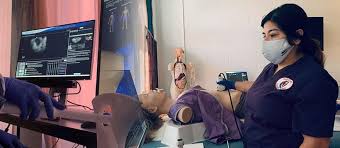The Exciting Field of Ultrasound Technology
Ultrasound technology plays a crucial role in modern healthcare, allowing medical professionals to visualize internal organs and tissues without invasive procedures. As the demand for skilled ultrasound technicians continues to grow, more individuals are considering pursuing a career in this dynamic field.
Why Choose Ultrasound Tech School?
Ultrasound tech schools offer comprehensive training programs that prepare students for a rewarding career in healthcare. These programs typically cover topics such as anatomy, physiology, patient care, medical ethics, and ultrasound imaging techniques. Students also gain hands-on experience through clinical internships, where they work alongside experienced professionals in real healthcare settings.
The Benefits of Becoming an Ultrasound Technician
Graduates of ultrasound tech schools enjoy a range of benefits, including:
- Job Stability: The healthcare industry relies heavily on ultrasound technology, ensuring a steady demand for qualified professionals.
- Competitive Salary: Ultrasound technicians typically earn above-average salaries compared to other allied health professions.
- Fulfilling Work: Helping physicians diagnose and treat patients using cutting-edge technology can be incredibly rewarding.
- Career Advancement: With experience and additional certifications, ultrasound technicians can pursue specialized roles or move into management positions.
How to Choose the Right Ultrasound Tech School
When selecting an ultrasound tech school, consider the following factors:
- Accreditation: Ensure that the program is accredited by reputable organizations to guarantee quality education and eligibility for certification exams.
- Clinical Opportunities: Look for schools that offer extensive hands-on training through partnerships with local healthcare facilities.
- Career Services: Seek institutions that provide job placement assistance and support for graduates entering the workforce.
- Curriculum: Evaluate the curriculum to ensure it covers essential topics and aligns with your career goals.
If you have a passion for healthcare and technology, pursuing a career as an ultrasound technician may be the perfect choice for you. Explore reputable ultrasound tech schools in your area and embark on a fulfilling journey towards becoming a vital member of the healthcare team!
Top 5 FAQs About Ultrasound Tech School: Understanding the Field, Career Prospects, Training Duration, Enrollment Requirements, and Specialization Opportunities
- What is ultrasound technology and how does it work?
- What are the job prospects for graduates of ultrasound tech schools?
- How long does it take to complete training at an ultrasound tech school?
- What are the prerequisites for enrolling in an ultrasound tech program?
- Are there opportunities for specialization or further education after completing ultrasound tech school?
What is ultrasound technology and how does it work?
Ultrasound technology is a non-invasive medical imaging technique that uses high-frequency sound waves to create detailed images of internal structures in the body, such as organs, tissues, and blood vessels. During an ultrasound procedure, a transducer device emits sound waves into the body, which then bounce off different tissues and organs to create echoes. These echoes are captured by the transducer and converted into real-time images displayed on a monitor. By analyzing these images, healthcare professionals can assess the health and function of various body parts, diagnose medical conditions, monitor pregnancies, and guide minimally invasive procedures. Ultrasound technology is safe, painless, and does not involve radiation exposure, making it a valuable tool in healthcare for both diagnostic and therapeutic purposes.
What are the job prospects for graduates of ultrasound tech schools?
Prospective graduates of ultrasound tech schools can look forward to promising job prospects in the healthcare industry. As the demand for diagnostic imaging services continues to rise, so does the need for skilled ultrasound technicians. Graduates can explore various employment opportunities in hospitals, clinics, imaging centers, and physician’s offices. With a projected growth rate higher than the average for all occupations, ultrasound technicians can expect a stable and rewarding career path. Additionally, advancements in technology and healthcare practices ensure that graduates of ultrasound tech schools remain in high demand as essential members of the healthcare team.
How long does it take to complete training at an ultrasound tech school?
The duration of training at an ultrasound tech school typically varies depending on the specific program and the level of education desired. Most ultrasound technology programs can be completed in 1 to 2 years for an associate degree or certificate, while a bachelor’s degree may take around 4 years to finish. Some schools also offer accelerated or part-time options to accommodate students with different schedules and commitments. It’s important for prospective students to research and choose a program that aligns with their career goals and timeline for completion.
What are the prerequisites for enrolling in an ultrasound tech program?
Before enrolling in an ultrasound tech program, it is important to be aware of the common prerequisites that most schools require. Typically, applicants must have a high school diploma or equivalent to be eligible for admission. Some programs may also require completion of specific coursework in subjects such as anatomy, physiology, biology, and mathematics. Additionally, candidates may need to demonstrate strong communication skills, critical thinking abilities, and a genuine interest in healthcare and technology. Meeting these prerequisites ensures that students are well-prepared to succeed in their ultrasound tech training and embark on a successful career in this dynamic field.
Are there opportunities for specialization or further education after completing ultrasound tech school?
After completing ultrasound tech school, graduates have various opportunities for specialization and further education to enhance their careers in the field of medical imaging. Many ultrasound technicians choose to pursue additional certifications in specialized areas such as vascular ultrasound, echocardiography, or obstetric and gynecologic sonography. These certifications allow technicians to expand their skill set and qualify for more advanced roles within healthcare settings. Furthermore, some ultrasound technicians may opt to pursue higher education, such as a bachelor’s degree in diagnostic medical sonography or related fields, to advance their knowledge and expertise in the field. Continuing education and specialization can open up new career pathways and opportunities for growth within the dynamic field of ultrasound technology.

